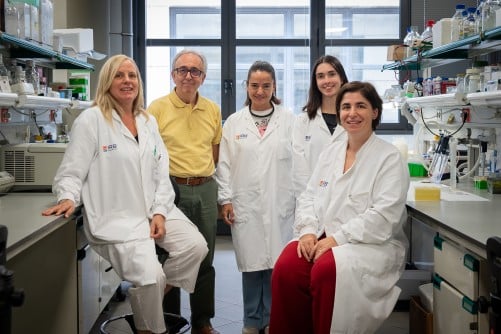
A groundbreaking study from the Institute for Research in Biomedicine (IRB Barcelona) has unveiled a potential new strategy for treating obesity without reducing food intake. Co-led by Dr. Antonio Zorzano and Dr. Manuela Sánchez-Feutrie, the research, published on September 4, 2025, in Nature Communications, highlights the role of a protein called Neuritin 1, previously associated with the nervous system, in regulating energy expenditure and metabolic health in animal models.
The findings suggest that enhancing the levels of Neuritin 1 in brown adipose tissue can significantly boost energy burning. This mechanism sets it apart from existing anti-obesity medications, such as Ozempic and tirzepatide, which primarily work by suppressing appetite. “By increasing the levels of Neuritin 1 specifically in brown fat, we observed that the animals burned more energy, which helped prevent fat accumulation,” Dr. Zorzano stated. He is also a professor at the University of Barcelona and a researcher at CIBERDEM.
Mechanism of Action and Health Benefits
Neuritin 1 has traditionally been recognized for its role in neuronal plasticity. However, this study reveals its critical function in brown fat, a type of fat that generates heat through a process known as thermogenesis. This activity is essential for maintaining body temperature, particularly in cold environments. The researchers employed a viral vector to induce Neuritin 1 overexpression specifically in thermogenic fat cells. This approach resulted in a sustained increase in metabolic activity without altering food intake or physical activity levels in the animals.
The metabolic boost provided by Neuritin 1 led to several health improvements, including reduced weight gain, enhanced insulin sensitivity, and lower liver inflammation, even in subjects fed high-calorie diets. Dr. Sánchez-Feutrie emphasized the significance of these findings, stating, “These findings point to Neuritin 1 as a promising therapeutic candidate for treating obesity and its associated conditions, such as type 2 diabetes and fatty liver disease, through a mechanism that differs from current approaches.”
Implications for Human Health
Beyond the promising results observed in animal models, genetic data in humans indicate a correlation between Neuritin 1 and obesity susceptibility. This connection raises the potential for translating these findings into effective therapeutic strategies for human patients. The research team is currently investigating ways to develop treatments based on this discovery.
The study benefited from the collaborative efforts of various core facilities at IRB Barcelona, including Bioinformatics and Biostatistics, Functional Genomics, Protein Expression, and Histopathology. It also involved partnerships with esteemed institutions such as the CNRS in France, Karolinska Institutet in Sweden, and the University of Houston in the United States.
While the research presents exciting possibilities for future obesity treatments, it is important to note that it remains in the early stages. Further studies will be necessary to evaluate the efficacy and safety of potential applications in humans. The discovery of Neuritin 1 as a local metabolic regulator of brown adipose tissue marks a significant advancement in the understanding of energy metabolism and its implications for health.







